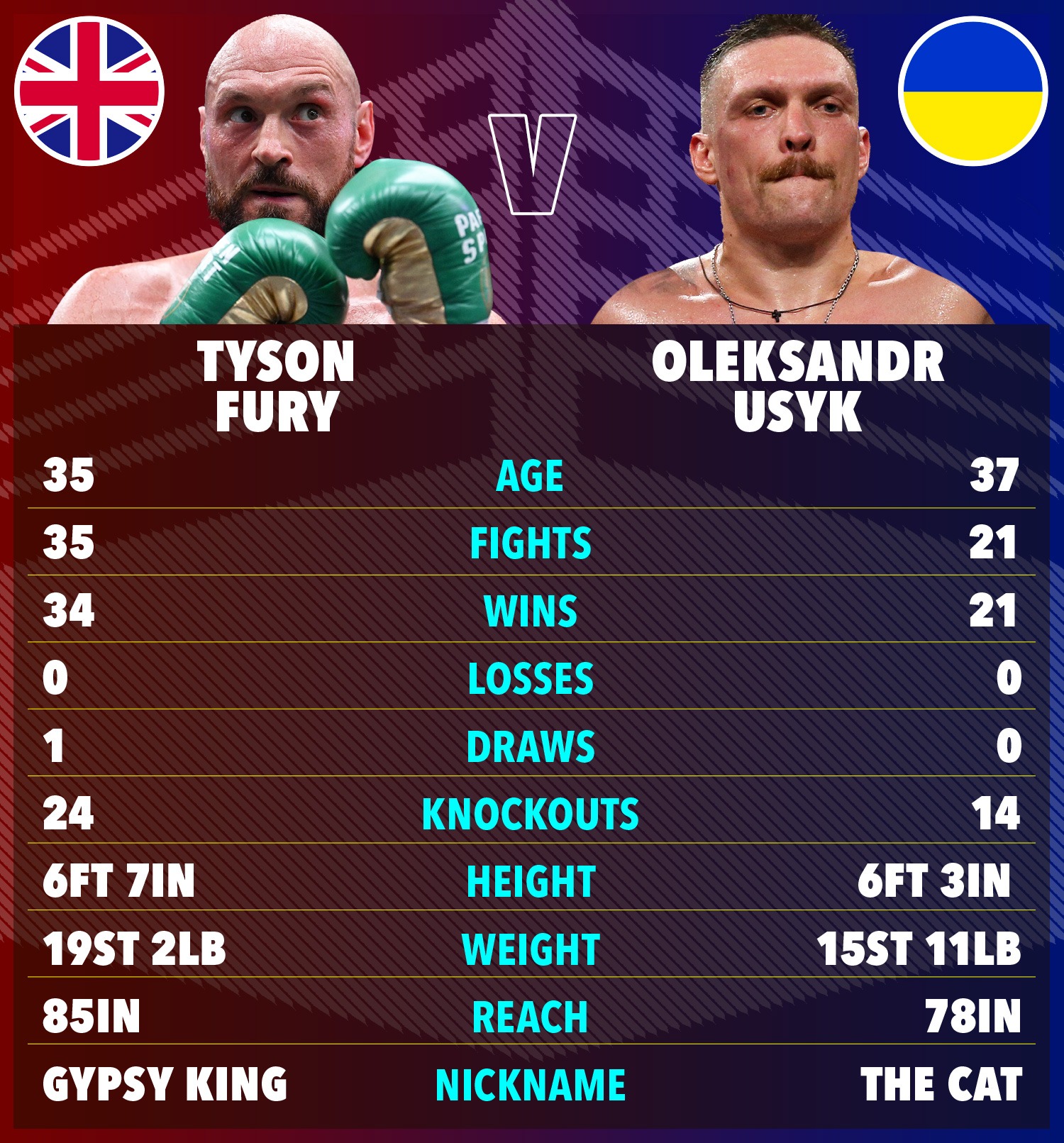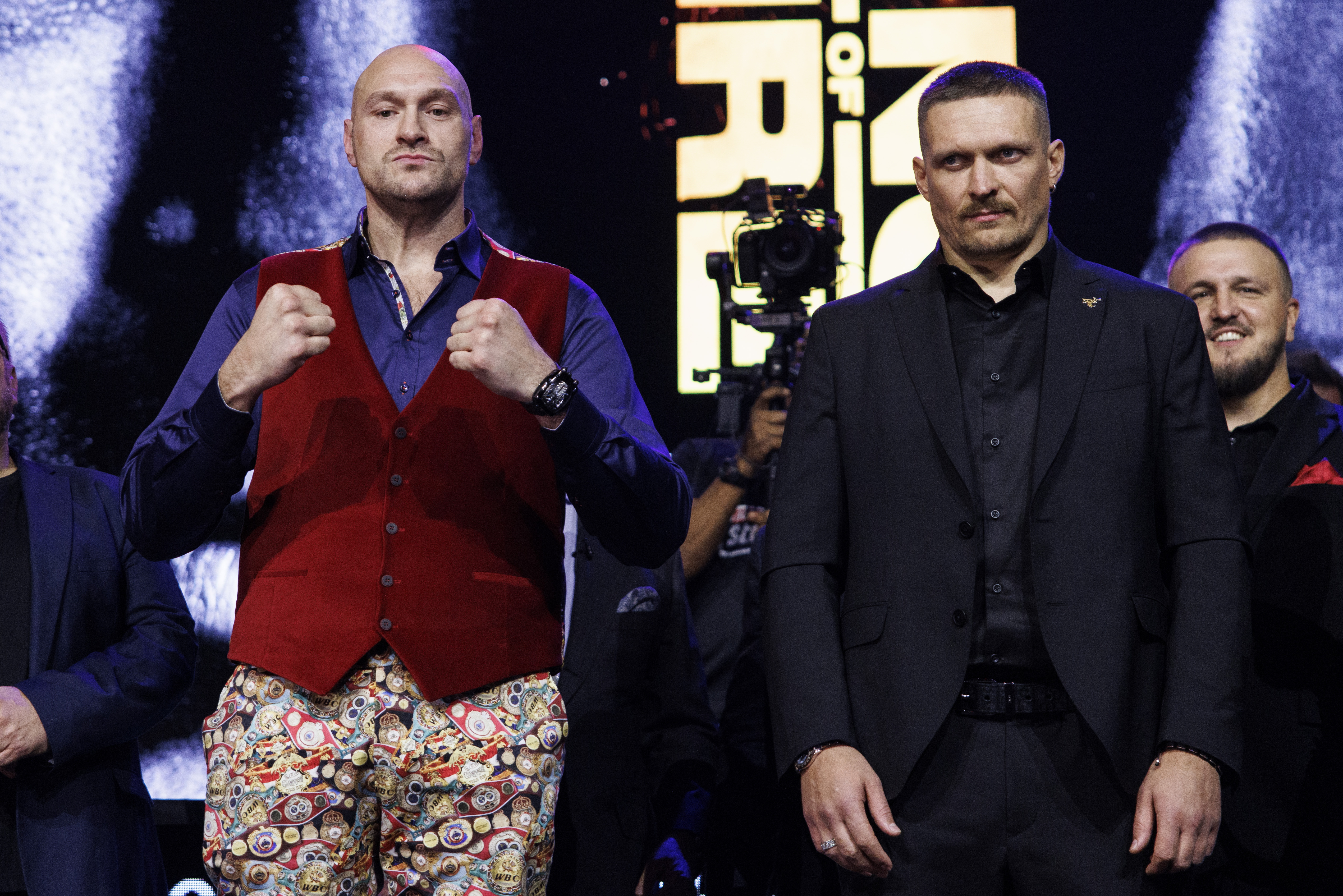Fury at Risk of Disqualification?
Tyson Fury's toughest opponent has made a bold prediction about the outcome of his upcoming fight against Oleksandr Usyk, suggesting that Fury could face disqualification in the ring. The two heavyweight champions are set to face off in the division's first-ever four-belt unification bout on May 18 in Saudi Arabia.
A Familiar Rivalry
Despite the high stakes of the upcoming match, Usyk will not be the first ex-cruiserweight champion that Fury, 36, has encountered in the ring. In his American debut back in 2013, Fury took on then-heavyweight newcomer Steve Cunningham in New York. Cunningham managed to floor Fury and build an early lead before ultimately being worn down and defeated in round seven.
Prediction of Defeat
Steve Cunningham, now 47, shared his insight on the Fury vs. Usyk bout, stating, "I think Usyk wins by decision against Fury. Either that or Fury gets disqualified." Cunningham believes that Fury will resort to leaning and laying on Usyk to tire him out, a strategy that may not go unnoticed by the referee.
Fury's Acknowledgment
Fury has previously acknowledged Cunningham as his toughest opponent, admitting in an interview with Joe Rogan in 2018 that "Cunningham was the hardest fight I ever did have in my whole career, amateur or professional." However, opinions may have shifted after Fury's controversial split-decision victory over MMA star Francis Ngannou in October.

Reflecting on Past Matches
Cunningham reflected on Ngannou's performance against Fury, noting, "Ngannou only looked as good as he did fighting Fury because Fury didn’t take fighting an MMA guy seriously." Despite being dropped by Ngannou, Fury managed to secure the win, showcasing his resilience in the ring.
With the highly anticipated Fury vs. Usyk fight on the horizon, fans are eager to see how the battle between these heavyweight titans will unfold.
Frequently Asked Questions
What are the risks associated with professional boxing?
Professional boxing, like any contact sport, carries inherent risks. These include acute injuries such as cuts, bruises, broken bones, and head trauma, as well as potential chronic conditions from repeated impacts, such as concussion syndromes or neurological disorders. Proper training, safety equipment, and adherence to boxing regulations help mitigate risks, but they can never be fully eliminated. To box professionally, you must accept these risks and be able to recognize them.
What kind diet should an amateur boxer follow to improve their performance?
A novice boxer needs to follow a balanced nutritional diet that will fuel intense workouts while promoting recovery. It is generally recommended to consume a mix of carbohydrates for energy, lean proteins for muscle repair and growth, and healthy fats for overall health. Hydration, vitamins, and minerals are critical as well. Consulting with a sports nutritionist can provide a personalized diet plan that aligns with the boxer’s training regimen and weight class targets.
What role do managers and promoters have in the professional career of a boxer?
Managers and promoters play pivotal roles in a boxer’s professional career. Managers guide the career of the boxer, negotiate contracts and handle the business affairs for the boxer. Also, they help select the right fights while looking out for the interests of the boxer. Promoters focus their efforts on organizing events, marketing the fights, and attracting sponsor and audience attention.
What age can you learn to box professionally?
There are age restrictions in professional boxing. Most boxing commissions insist that boxers must be 18 or older in order to fight professionally. While there isn’t a specific upper age limit, health and physical factors will limit how old you can compete safely and effectively. Before taking up a sport professionally, older athletes should be assessed thoroughly for their fitness and risks.
How important is physical conditioning in professional boxing?
Professional boxing requires a high level of physical conditioning. The sport requires high levels of speed, strength, endurance, agility, and endurance. Professional boxers should follow a tailored fitness plan that includes aerobic and aerobic workouts, strength and endurance training, and flexible exercises. Boxers’ ability to perform and train effectively in the ring will be compromised if they do not have superior physical condition.
Can anyone learn professional boxing?
Not everyone can compete at the professional level. Professional boxing requires a unique blend of talent, physical abilities, mental toughness, and dedication. Prospective boxers should also be willing accept the inherent risk of the sport. A thorough assessment by a coach can determine if a person has the potential to make a career out of boxing.
How important is mental toughness in professional boxing?
In professional boxing, mental toughness is just as important as physical fitness. The sport requires resilience, focus and the ability to handle stress, as well as the psychological fortitude needed to overcome adversity. Mental preparation involves visualization, stress management techniques, and developing a strong mindset to confront the challenges within the ring. Without mental toughness, a boxer may struggle to perform optimally under the intense conditions of professional competition.
Statistics
- Cardiovascular fitness is critical, with a focus on high intensity interval training, comprising up to 40% of a boxer’s conditioning program.
- The average age for boxers to turn professional is between 18 to 25 years, though many continue to compete well into their 30s and beyond.
- Research shows that a boxer’s reaction time is typically under 0.25 seconds, honed through repetitive drills and sparring.
- Professional boxers typically train 4 to 6 hours per day, 5 to 6 days a week, depending on their fight schedule.
- A study showed that most professional boxers have spent more than 4 years in training before their first professional bout.
- As per recent surveys, only about 17% of professional boxers reach a title shot opportunity in their careers.
- Approximately 80% of professional boxers start their career in the amateur ranks before transitioning to the professional level.
External Links
boxingnews24.com
expertboxing.com
teamusa.org
proboxing-fans.com
sweetsciencefitness.com
ibhof.com
boxingscene.com
How To
How to Cut Weight for a Boxing Fight
A disciplined approach is required to manage your weight prior to a boxing match. Create a nutrition program that emphasizes hydration and complex carbohydrates while cutting down on foods high in sodium and fat. Water weight can be controlled by increasing your water consumption several weeks prior to the fight, and then gradually decreasing it. Add sauna sessions to your routine if you need to and intensify your workouts if extra pounds are a problem. But always put safety first and avoid extreme weight loss methods.

